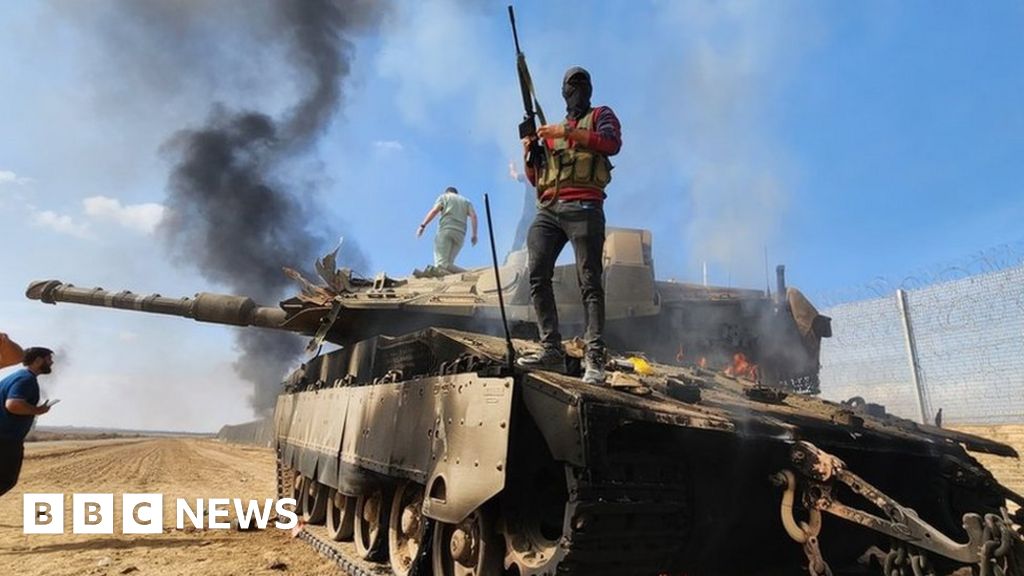I guess not strictly news - but with all of the vitriol I have seen in discussions on the Israel situation, that have boiled down to arguments over wording, I feel that this take from the BBC is worthy of some discussion.
Mods, feel free to remove if this is not newsy enough.
Article: Why BBC doesn’t call Hamas militants ‘terrorists’ - John Simpson
Government ministers, newspaper columnists, ordinary people - they’re all asking why the BBC doesn’t say the Hamas gunmen who carried out appalling atrocities in southern Israel are terrorists.
The answer goes right back to the BBC’s founding principles.
Terrorism is a loaded word, which people use about an outfit they disapprove of morally. It’s simply not the BBC’s job to tell people who to support and who to condemn - who are the good guys and who are the bad guys.
We regularly point out that the British and other governments have condemned Hamas as a terrorist organisation, but that’s their business. We also run interviews with guests and quote contributors who describe Hamas as terrorists.
The key point is that we don’t say it in our voice. Our business is to present our audiences with the facts, and let them make up their own minds.
As it happens, of course, many of the people who’ve attacked us for not using the word terrorist have seen our pictures, heard our audio or read our stories, and made up their minds on the basis of our reporting, so it’s not as though we’re hiding the truth in any way - far from it.
Any reasonable person would be appalled by the kind of thing we’ve seen. It’s perfectly reasonable to call the incidents that have occurred “atrocities”, because that’s exactly what they are.
No-one can possibly defend the murder of civilians, especially children and even babies - nor attacks on innocent, peace-loving people who are attending a music festival.
During the 50 years I’ve been reporting on events in the Middle East, I’ve seen for myself the aftermath of attacks like this one in Israel, and I’ve also seen the aftermath of Israeli bomb and artillery attacks on civilian targets in Lebanon and Gaza. The horror of things like that stay in your mind forever.
But this doesn’t mean that we should start saying that the organisation whose supporters have carried them out is a terrorist organisation, because that would mean we were abandoning our duty to stay objective.
And it’s always been like this in the BBC. During World War Two, BBC broadcasters were expressly told not to call the Nazis evil or wicked, even though we could and did call them “the enemy”.
“Above all,” said a BBC document about all this, “there must be no room for ranting”. Our tone had to be calm and collected.
It was hard to keep that principle going when the IRA was bombing Britain and killing innocent civilians, but we did. There was huge pressure from the government of Margaret Thatcher on the BBC, and on individual reporters like me about this - especially after the Brighton bombing, where she just escaped death and so many other innocent people were killed and injured.
But we held the line. And we still do, to this day.
We don’t take sides. We don’t use loaded words like “evil” or “cowardly”. We don’t talk about “terrorists”. And we’re not the only ones to follow this line. Some of the world’s most respected news organisations have exactly the same policy.
But the BBC gets particular attention, partly because we’ve got strong critics in politics and in the press, and partly because we’re rightly held to an especially high standard. But part of keeping to that high standard is to be as objective as it’s possible to be.
That’s why people in Britain and right round the world, in huge numbers, watch, read and listen to what we say, every single day.



You misunderstand.
Proper old-school journalists, like John Simpson, won’t be quick to call someone a terrorist. They will however report on someone who called them a terrorist.
It is their job to report the facts. That means that they report what they see and what they hear. Nothing more. That is journalism.
Coming to the conclusion that someone is a terrorist, isn’t news or journalism. It’s analysis or opinion. Often the journalist is in no position to form an opinion either way, and it’s not really his job anyway.
The reason this sounds weird to many, is because journalism has gone down the shitter. This used to be standard. Reuters for example, is still quite rigorous in this. But most news organisations now mix factual reporting with analysis. Some ‘news’ organisations remove the news/facts entirely. Basically, reading an article written by a good journalist, you should not be able to tell what side of the argument they are.
Eg.
Good: According to Mr. X, the apple was red and tasty. -> the journalist is simply reporting on what Mr. X said. The reader can decide if Mr. X was telling the truth.
Bad: According to Mr. X, the red apple was tasty. -> the journalist wasn’t there to see if the apple was red, Mr. X could be mistaken. The reader doesn’t realise that the colour of the apple was described as being red by Mr. X and can’t form their own opinion on whether to believe Mr. X.
The journalist doesn’t avoid mentioning the apple is allegedly red. They just make it clear that they themselves aren’t saying what colour it is, as they weren’t there to witness what colour it was and because their opinion doesn’t matter
And I know this may sound stupid, but it helps avoid (inadvertent) bias or accusations thereof.
It’s spelled “Xitter” now… as in “going down the Xitter”.